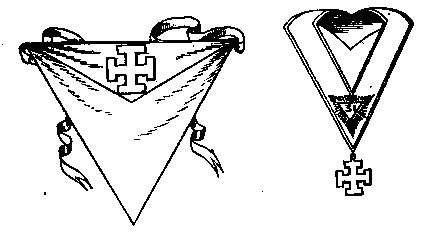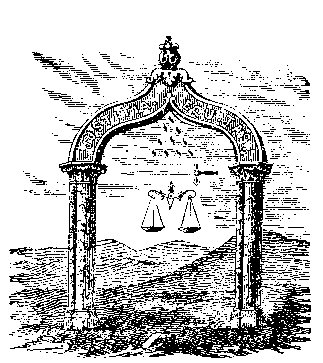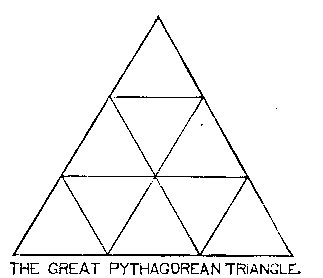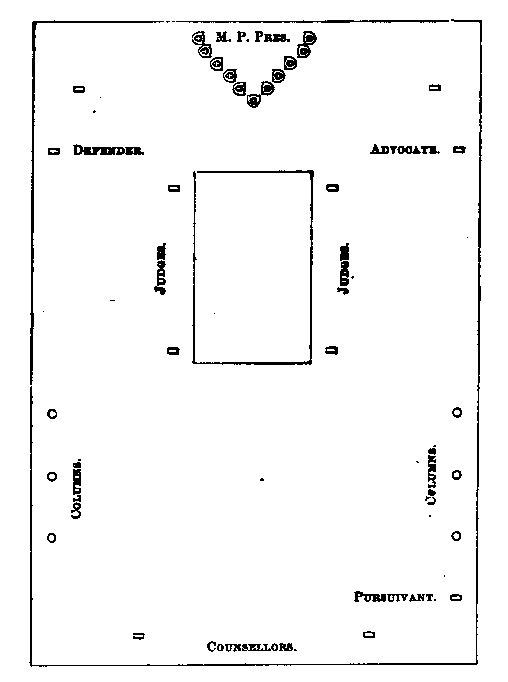The Web of Hiram |
Degrees of the Ancient and Accepted Scottish Rite14. Grand Elect, Perfect and Sublime Master Mason 15. Knight of the East or Sword 17. Knights of the East and West 18. Knight of the Rose-Croix de Heredom 20. Grand Master of all Symbolic Lodges 21. Noachite or Prussian Knight 25. Knight of the Brazen Serpent 29. Knight of St Andrew, or Patriarch of the Crusades |
GRAND INSPECTOR INQUISITOR COMMANDERThe Thirty-First Grade of the Ancient and Accepted Scottish Rite, and the Second Degree of the Chivalric Series
ARGUMENTThe practical test of the neophyte in the degree of Knight Kadosh, is in this degree of Inquisitor Commander changed to a thorough examination under charges against Masonic law and duty before the Order of the Five Brethren. The wise sayings of sages and lawgivers are quoted for instruction, to remind the Knight of the serious vows that he has assumed, and how to preside in judgment and expound the law; to judge justly and punish sternly; but ever remembering the frailty and imperfection of human nature, to pardon and forgive while there yet remains hope of reformation. To render judgment is a stern duty and an unwelcome task to be performed; for in this a man usurps, to some extent, the functions of God; he should therefore himself be just, Upright, imparilal, disregarding persons, intluence, rank. and power. DECORATIONSThe hangings are white, as also the canopy under which is the throne of the President. There are ten gilded columns; one on each side of the President in the East; one on each side of the Counsellors in the West; three on the south side of the Tribunal, and three on the north; equidistant from each other. Over the column on the right of the President is incribed in large letters the word Justitia. Over that upon his left, the word Equitas.
From these two columns springs a Gothic arch, from the apex whereof is suspended over the head of the President the Tetractys of Pythagoras, thus:
and under it a naked sword and the scales of justice. Over the column on the right of the Counsellors is inscribed the word Lenitas; upon the left, the word Misericordia. From these two columns springs a Gothic arch, from the apex whereof is suspended in letters of gold the sacred word of the eighteenth degree. On the three columns in the south, going from east to west, are the busts of Moses, Zoroaster, and Minos, with the name of each inscribed on his column. On the columns on the north, also going from east to west, are the busts of Confucius, Socrates, and Alfred the Great, with the name of each inscribed on his column. In front of the President is a table, on which are the Square and Compasses, the Plumb and Level, an hourglass, a skull and cross-bones, a small pair of Scales, a naked Sword, and the Book of Constitutions. In the centre of the room are ten lights, in the east ten, and in the west ten; each ten being arranged in the form of the Tetractys. The altar is covered with a black cloth; Judges' table covered with green cloth. TITLES, OFFICERS, AND THEIR STATIONSThe assembly is styled Supreme Tribunal. The presiding officer is styled Most Perfect, President and sits in the east.
The Wardens are styled Counsellors, and sit in the west. The Secretary (Keeper of the Seals and Archives) is styled Chancellor, and sits on the right of the President. The Treasurer sits on the left of the President. The Advocate is stationed in the south. The Defender is stationed in the north. The Pursuivant is stationed on the right of the Counsellors. All the members of the Supreme Tribunal, except the President, are styled Illustrious. REGALIA, DECORATIONS, ETCNo apron is worn in the Supreme Tribunal. In the inferior bodies the Grand Inspector Inquisitor Commanders, wear one of entirely white sheep-skin, with a Teutonic cross, embroidered in silver, on the flap. The collar is white; at the point is a triangle emitting rays, embroidered in gold, in the centre of which is the number 31 in Arabic figures. In the inferior bodies, instead of a collar, a Grand Inspector Inquisitor Commander may wear around his neck a golden chain, from which hangs the cross of the Order; the links of the chain are formed of the interlaced attributes of the eight fundamental degrees of Masonry-viz., 1st, 2d, 3d, 4th, 14th, 16th, 18th, and.30th The jewel is a silver Teutonic cross. The hat, same as Kadosh. When a Grand Inspector Inquisitor Commander, wearing the proper insignia, viisits a Lodge of an inferior degree, he announces himself as a Grand Inspector Inquisitor Commander. He is proved in the ordinary manner, and the report is made in the ear of the Master, who causes all the members to be placed around the altar; he then sends the two Wardens to receive him, by whom he is conducted to the altar. The Master then leaves his seat, and placing the three gavels upon the altar, he presents them to the visiting brother, who accepts, and returns them to the Master, and to each of the Wardens, after which he is conducted by the Master to the seat of honour. RECEPTIONPRAYERHear us with indulgence, O infinite Deity, whose attributes are infinite, and yet infinitely harmonious. Thou, of whose essence all justice, equity, and mercy, intermingled into one infinite excellence. Thou, to whom all thoughts and all actions of men are known and visible, as thine own; to whom the infinite past and the infinite future are one now; and the infinitudes of space in all directions are here. Give us the wisdom and the will to judge justly, accurately, and mercifully; and when we come to be finally judged by thee, do not thou judge us as, in our feebleness and passion, we may have judged others; but forgive us and take us home to thee. Amen! If the Knight Kadosh, when performing his pilgrimage, proves himself recreant of any obligation, he should here be accused of the same. If deemed an unworthy Knight by the Judges on any accusation, he should be returned to the outer world for a probationary period; if not, the Most Perfect President proceeds, first taking a vote of the Judges. M.: P.: Pres.: Illustrious Knight, you desire to take upon yourself an arduous, responsible office. There is but one infallible, unerring Judge. All human judgment is, at best, uncertain; serious in its consequences, it must often, when time develops its errors, produce regret, and sometimes remorse. It is not wise to seek to judge our fellow-man; it is a stern duty, and an unwelcome task to be performed, and not a privilege to be coveted; and woe unto that man who assumes the prerogative of judgment, and, to some extent, usurps the functions of God, not being himself just, upright, impartial. Subsequent to the dismissal of the Inquisition, and preparatory to the lessons and warnings being given, the music will be played. I was the just King Alfred of Saxon England; I framed wise laws, made upright judges, independent of my will and that of the people, and caused just and speedy judgment to be given. In all my realm, justice and right were sold to none; denied to none; delayed to none. I slept little, I wrote much; I studied more. I reigned only to bless those over whom I had dominion. I have vanished into the thin past, and many ages have marched in solemn procession by my grave, yet I still live in the memory of men. They call me great king, wise law giver, just judge; follow, then, my example, or shudder to sit in judgment on thy fellows. I was Socrates, the Athenian; I knew the holy mysteries, and reverenced God in nature. In the sacred groves of Athens, I taught to young and old that God was one, and the soul of man immortal. I taught obedience to the laws and decrees of the people of Athens, and the council of five hundred. When I sat in the court of the Areopagus, I swore by the paternal Apollo, by Ceres, and by Jupiter the King, that I would sentence uprightly and according to law - or, when the law was silent, to the best of my judgment; and that I would not receive gifts, nor should any other for me; nor recieve bribes from any passion, prejudice, or affection; nor allow any other person to do the like by any means, whether direct or indirect, to prevent justice in the court. And when, by an unjust judgment, the same court condemned me to death, I refused to flee and escape, lest I should bring the laws into disrepute; holding the good citizen bound to submit to even the unjust judgment of the State. If thou wouldst fain become a judge of others, first prepare thyself by learning to obey the laws. I was Confucius, who read and interpreted to the people of ancient China the great laws engraved by the finger of God, in everlasting letters, upon the pages of the many-leaved book of nature. I said to them, desire not for your country any other benefit than justice; the great law of duty is to be looked for in humanity. "Justice is Equity," to render to every man that to which he is entitled. He who would stand above the ordinary level of man must be exempt from prejudices and self-conceit and obstinacy, and be governed by the mandates of justice alone. Hear much, reflect much, and say nothing superfluous. Let doubt of guilt be acquitted; and presumption of innocence be solid proof. " That is the noblest recompense of human virtue!" Do thou strive so to live and act, to obey and govern, and thou, too, mayest live in the good opinion of men, after thou art dead, and thine influences may make thee, too, a king over the minds of men. I was Minos, the lawgiver of Crete. I taught the Cretans that the laws which I enacted were dictated by Zeus, the Father; for all true and righteous laws, and all human justice, are but developments of that eternal and infinite justice, that is of the essence of the Deity . He who assumes to judge his brethren clothes himself with the prerogative of God. " Woe unto thee," if, being thyself vicious or criminal, thou dost assume to judge others; and still more, if thou givest corrupt judgment; for then will thy memory be execrated, and in all time it shall be the bitterest reproach to an unjust judge to call him by thy name. I was Zoroaster, whose words became law to the Persians. I said he is the best servant of God, whose heart is upright, who is liberal, with due regard to what is just to all men; who turns not his eyes toward riches, and whose heart wishes well to everything that lives. He alone is just who is charitable, and merciful in his judgments; and he alone is wise who thinks well, and not evil, of other men. Satisfy thine own conscience, and fear neither the outrages of fortune nor the injuries of enemies. Crime is not to be measured by the issue of events, but by the bad intentions of the doer. Study, therefore, the dominion of thyself, and quiet thine own commotions, and hold it the noblest ovation to triumph over thy passions. I was Moses, the leader and lawgiver of the Israelites. I was initiated into the mysteries and wisdom of Ancient Egypt; and that wisdom dictated the statutes by which Israel was governed. Thou shalt take no gift; for the gift blindeth the wise and perverteth the words of the righteous. Ye shall do no unrighteousness in judgment. Thou shalt not respect the person of the poor, nor honour the person of the mighty. Ye shall hear the small as well as the great. Ye shall not fear the face of man; for judgment is of God. Sen.: Couns.: Thou hast heard the words of the great sages, lawgivers, and philosophers of antiquity. Behold! the monogram of the greatest lawgiver that has ever come among men, and listen reverentially to his teachings. If ye forgive not men their trespasses, neither will your heavenly Father forgive your trespasses. But if ye forgive men their trespasses, your heavenly Father will also forgive you. With what judgment ye judge, ye shall be judged. And with what measure ye mete, it shall be measured to you again. If thy brother trespass against thee, go and tell him his fault between thee and him alone. If he shall hear thee, thou hast gained thy brother. Judge not according to the appearance, but judge righteous judgment. If thy brother trespass against thee, rebuke him, and if he repent, forgive him; and if he trespass against thee seven times in a day, and seven times in a day turn again to thee, saying, I repent," thou shalt forgive him. Blessed are the merciful; for they shall obtain mercy. You have heard the lessons of immortal wisdom, once uttered by mortal lips that have long since mouldered into dust. Through those lips God spake unto men; for of him alone cometh all wisdom. M.: P.: Pres.: I invest you with the white collar and jewel of this degree; see that the purity of the former and the lustre of the latter be never sullied or dimmed by injustice, inhumanity, or impurity. |
|
|
||||||||||||
|
|
[ to top ] |



